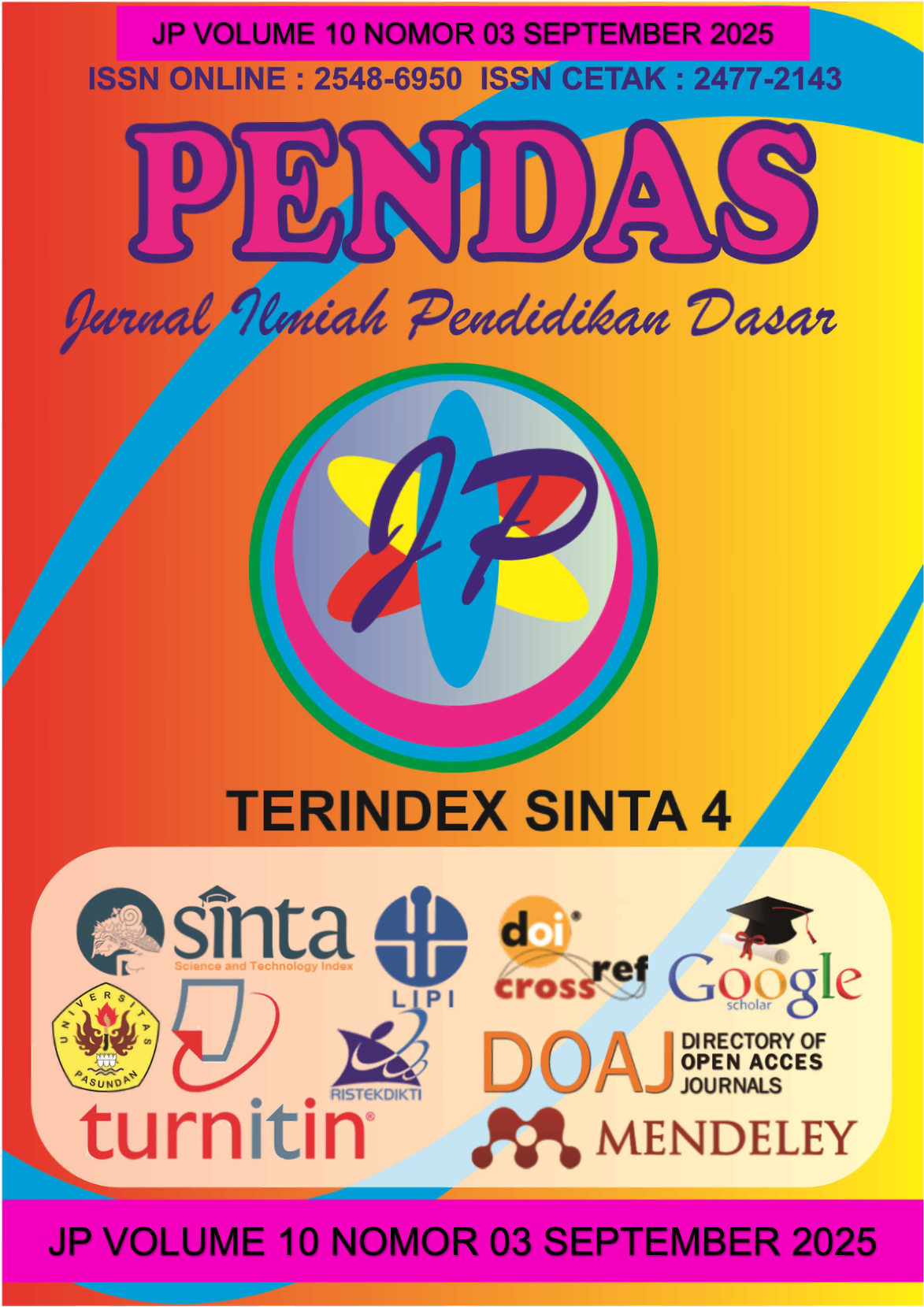PENGARUH MODEL PROBLEM BASED LEARNING TERHADAP HASIL BELAJAR SISWA KELAS X PADA MATA PELAJARAN GEOGRAFI DI SMA NEGERI 1 BATANG ANAI
DOI:
https://doi.org/10.23969/jp.v10i03.30886Keywords:
Problem Based Learning, Learning Result, GeographyAbstract
This research is motivated by the low learning outcomes of class X students of SMA Negeri 1 Batang Anai, especially in the subject of Geography. From these problems, the problem can be formulated as follows: How are the Geography Learning Outcomes Before the Implementation of the Problem Based Learning Model for Class X at SMA N 1 Batang Anai? How are the Geography Learning Outcomes After the Implementation of the Problem Based Learning Model for Class X at SMA N 1 Batang Anai? How is the Effect of the Problem Based Learning Model on the Geography Learning Outcomes of Class X students at SMA N 1 Batang Anai? The purpose of this study is to determine the Geography Learning Outcomes Before the Implementation of the Problem Based Learning Model for Class X at SMA N 1 Batang Anai, to determine the Geography Learning Outcomes After the Implementation of the Problem Based Learning Model for Class X at SMA N 1 Batang Anai and to determine the Effect of the Problem Based Learning Model on the Geography Learning Outcomes of Class X students at SMA N 1 Batang Anai. The results of statistical tests with the help of SPSS version 18 showed a significance value of 0.001 < alpha significance of 0.05. It can be concluded that Ha is accepted and Ho is rejected, which means that there is an influence of the problem-based learning model on the learning outcomes of class X students in geography subjects at SMA Negeri 1 Batang Anai. The results of this study are expected to be one of the references in developing further research and this study, namely the PBL model, can be used to create innovative learning so that it can provide a good contribution to learning.
Downloads
References
Buku :
Arifin. Zainal Arifin. 2011. Evaluasi Pembelajaran.Bandung: PT. Remaja Rosda Karya. Cet.3.
Arikunto, Suharsimi. 2010. Prosedur Penelitian. Jakarta : Rineka Cipta.
Erwan Agus Purwanto dan Dyah Ratih Sulistyastuti, Metode Penelitian Kuantitatif, (Yogyakarta: Penerbit Gava Media, 2017), hlm. 25.
Zainal Arifin, Evaluasi Pembelajaran, (Bandung: PT. Remaja Rosda Karya, 2011), cet.3, hal. 148
Zaini, Hisyam. (2008). Strategi Pembelajaran Aktif. Yogyakarta: Pustaka Insan Madani
Artikel in Press :
Paus, J. R., & Sumilat, J. M. (2021a). Assessment of Learning Outcomes in Online Learning Process. EuropeanJournal Of Humanities and Educational Advancement, 2(7), 75–77.https://media.neliti.com/media/publications/382560-none-cffc6eb2.pdf
Paus, J. R., & Sumilat, J. M. (2021b). Improving the creativity of studens through project based learning. In Research on Cyber Pedagogy in The Covid 19 (1st ed., Vol. 1, Issue 1, pp. 19–21). Novateur Publication India.
Pratiwi, E. T., & Setyaningtyas, E. W. (2020). Kemampuan Berpikir Kritis Siswa Melalui Model Pembelajaran Problem Based Learning dan Model Pembelajaran Project Based Learning. Jurnal Basicedu, 4(2), 379– 388. https://doi.org/10.31004/basicedu.v4i2.362.
R. A., E. S., & E. S. (Juni 2021). Problem Based Learning: Apa dan Bagaimana. Journal for Physics And Applied Physics, 27-35.
Setiawan, T., Sumilat, J. M., Paruntu, N. M., & Monigir, N. N. (2022). Analisis Penerapan Model Pembelajaran Project Based. JURNAL BASICEDU, 6, 9736-9744.
Jurnal :
Amin, S. (2017). Pengaruh Model Pembelajaran Problem Based. JPG (Jurnal Pendidikan Geografi) , 25-36.
Isma, T. W., R. P., Wicaksana, T. I., E. T., & A. H. (2021). Peningkatan Hasil Belajar Siswa Melalui Problem Based Learning (PBL). Jurnal Ilmiah Pendidikan Dan Pembelajaran, Vol 6, 155-164.
Karlina, Lista., dkk, 2021. Faktor Kesulitan Belajar Geografi Siswa SMA Negeri di Kota Banjarmasin. Volume 1. Nomor 2. Jurnal Publikasi Berkala Pendidikan Ilmu Sosial.
Kurniawan, B., Dwikoranto, & Marsini. (April 2023). Implementasi Prolem Based Learning Untuk Meningkatkan Pemahaman Konsep Siswa: Studi Pustaka. Jurnal Praktisi Pendidikan, 2, 27-36
Larasati, D. A. (2017). Pengaruh Model Problem-Based Learning. Jurnal Geografi, 32-40.
Nafiah, Y. N., & Suyanto, W. (Februari 2014). Penerapan Model Problem Based Learning Untuk Meningkatkan Keterampilan Berpikir Kritisa dan Hasil Belajar Siswa. Jurnal Pendidikan Vokasi, Vol 4, 125-143.
Nafiati, Dewi Amaliah. 2021. Revisi Taksonomi Bloom: Kognitif, Afektif, Dan Psikomotorik. Humanika 21, No. 2.
Nisa, A. R. K., & Yuliawati, F. (2021). Analisis Penerapan Model Pembelajaran PBL (Project Based Learning) terhadap Proses Pembelajaran Siswa. 5(2), 175–182.
Produktivitas Kerja Karyawan Divisi Ekspor Pt. Dua Kuda Indonesia,” Jurnal Ilmiah Mprogress 11, no.1 (2021), hal.42
Pratama, I. S., Aini, S. R., Hidayat, L. H., Mursyid, M. H., & Muharromi, S. U. (2021). Pengembangan dan Validasi Kuesioner Pengetahuan Mahasiswa Farmasi Terkait Produk Kefarmasian serta Alat Kesehatan dalam Pencegahan Covid19. Jurnal Pijar Mipa, 16(2), hal. 6
Wibowo, N. (2016). Upaya Peningkatan Keaktifan Siswa Melalui Pembelajaran Berdasarkan Gaya Belajar di SMK Negeri 1 Saptosari. Jurnal Electronics, Informatics, and Vocational Education (ELINVO). Volume 1: 130-131.
Woa, K. M., Utaya, S., & Susilo, S. (2018). Pengaruh Model Pembelajaran Problem Based Learning. Jurnal Pendidikan, 406-411.
Yulianti, E., & Gunawan, I. (November 2019). Model Pemelajaran Problem Based Learning (PBL): Efeknya Terhadap Pemahaman Konsep dan Berpikir Kritis. Indonesian Journal of Science annd Mathematics Education, 399-408.
Downloads
Published
Issue
Section
License
Copyright (c) 2025 Pendas : Jurnal Ilmiah Pendidikan Dasar

This work is licensed under a Creative Commons Attribution 4.0 International License.



















